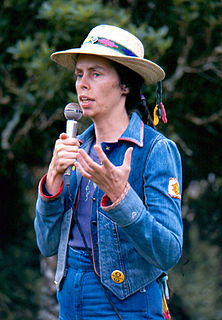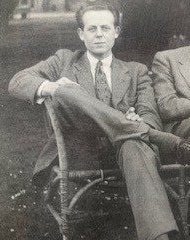A Quote by E. O. Wilson
Humanity is part of nature, a species that evolved among other species. The more closely we identify ourselves with the rest of life, the more quickly we will be able to discover the sources of human sensibility and acquire the knowledge on which an enduring ethic, a sense of preferred direction, can be built.
Related Quotes
Humanity is a biological species, living in a biological environment, because like all species, we are exquisitely adapted in everything: from our behavior, to our genetics, to our physiology, to that particular environment in which we live. The earth is our home. Unless we preserve the rest of life, as a sacred duty, we will be endangering ourselves by destroying the home in which we evolved, and on which we completely depend.
There is part of a structure in which every species is related to every other species. And they're built up on species, like a pyramid. The simpler cell organisms, and then the more complicated ones, all the way up to the mammals and birds and so forth. We call it 'developing upward'... The whole thing depends on every part of it. And we're taking out the stones from the pyramid.
We ourselves are part of a guild of species that lie within and without our bodies. Aboriginal peoples and the Ayurvedic practitioners of ancient India have names for such guilds, or beings made up (as we are) of two or more species forming one organism. Most of nature is composed of groups of species working interdependently.
It must be stressed that there is nothing insulting about looking at people as animals. We are animals, after all. Homo sapiens is a species of primate, a biological phenomenon dominated by biological rules, like any other species. Human nature is no more than one particular kind of animal nature. Agreed, the human species is an extraordinary animal; but all other species are also extraordinary animals, each in their own way, and the scientific man-watcher can bring many fresh insights to the study of human affairs if he can retain this basic attitude of evolutionary humility.
From the point of view of the species, death is part of this whole process. You could say that species have evolved in such a way that individual members last a certain time. Perhaps a certain kind of species would be better able to survive if the individuals didn't last too long. Other kinds could last longer.
Above all, we should question the consumer ethic, which uses up non-renewable resources, creates inequality and injustice, generates pollution, destroys other species and upsets the balance of nature. The consumer ethic not only defiles the environment by creating undesirable change in the biosphere but also corrupts the mind and body by defining pleasure in terms of ownership and absorption. Waste itself is a human concept; everything in nature is eventually used. If human beings carry on in their present ways, they will one day be recycled along with the dinosaurs.
A diverse ecosystem will also be resilient, because it contains many species with overlapping ecological functions that can partially replace one another. When a particular species is destroyed by a severe disturbance so that a link in the network is broken, a diverse community will be able to survive and reorganize itself... In other words, the more complex the network is, the more complex its pattern of interconnections, the more resilient it will be.
Clearly, we are a species that is well connected to other species. Whether or not we evolve from them, we are certainly very closely related to them. A series of mutations could change us into all kinds of intermediate species. Whether or not those intermediate species are provably in the past, they could easily be in our future.
The evolutionary vision is agnostic in regard to systems in the universe of greater complexity than those of which human beings have clear knowledge. It recognizes aesthetic, moral, and religious ideas and experiences as a species, in this case of mental structures or of images, which clearly interacts with other species in the world's great' ecosystem.
To the mind which looks not to general results in the economy of Nature, the earth may seem to present a scene of perpetual warfare, and incessant carnage: but the more enlarged view, while it regards individuals in their conjoint relations to the general benefit of their own species, and that of other species with which they are associated in the great family of Nature, resolves each apparent case of individual evil, into an example of subserviency to universal good.




































